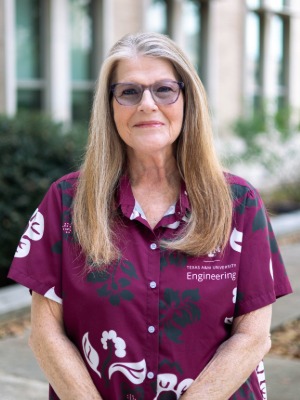The Department of Biomedical Engineering (BMEN) offers a minor to students in the College of Engineering who are interested in biomedical applications of engineering related to the fields of biomechanics, biomaterials and bioinstrumentation. Eligible students must submit an application to be considered for and allowed to pursue a minor in Biomedical Engineering. We recommend students have a strong foundation in Python.
Application windows
- April 1–May 1 for fall consideration
- November 1–December 1 for spring consideration
Eligibility
Students must meet the following requirements to be eligible for a minor in biomedical engineering:
- Admitted to a College of Engineering major
- Minimum cumulative GPA of 3.0
Requirements
- Maintain a cumulative 2.0 GPA in minor courses
- Complete the courses listed for the selected BMEN minor track
Once accepted into a particular track, changing a BMEN minor track will not be permitted unless by petition and a review by the Director of Undergraduate Programs.
Application steps
Eligible students must submit an application to be considered for and allowed to pursue a Minor in Biomedical Engineering.
- Complete the BMEN minor application, including the essay (250 words max) on why you want a biomedical engineering minor, and submit it during either of the application windows.
- After final grades are posted for the current semester, applications are reviewed and decisions made. Enrollment into BMEN courses will not be granted until decisions are made.
- All applicants and their advisors will be emailed once decisions have been made.
- Approved students MUST see a BMEN advisor to review courses, policies, and procedures.
- Once accepted, the student's major advisor will add the minor to their record.
Minor Tracks
-
The Biomechanics Track is designed to educate BMEN students in the field of biomechanics that spans from small-scale applications in molecular and cellular mechanics, tissue-scale applications such as cardiac and orthopedic implants, and whole body-scale applications for studying injury prevention and developing assistive devices. This track will provide students the opportunity to gain
greater depth of knowledge in their particular interests related to biomechanics. Through these courses, students will gainexperience applying mechanics principles to biomedical systems to aid in understanding the function of the human body and various medical conditions, and in the development of medical devices.
-
Cellular and Molecular Bioengineering affects cellular behavior using molecular-level interactions to understand, detect, mitigate, and improve human health. In this track, students will study critical cellular, molecular, and genetic processes, cell-biomaterial interactions, small and large biomolecules, nano- to micro-scale devices, bioreactors, and how to design and control the mechanical, chemical, and electrical processes of cells. Applications include synthetic biology systems, biomanufacturing, diagnostic medicine (e.g., lab-on-a-chip, organ-on-a-chip, mechanosensors), preventative medicine (e.g., molecular biosensors, imaging probes), and therapeutic medicine (e.g., drug design and delivery, nanomedicine, immunoengineering).
-
Computational Bioengineering generally describes the science of computational approaches to biological and medical problems, including molecular modeling, computational biomechanics, computational bioimaging, and healthcare informatics. In this track, students will apply engineering, mathematics, computer and data science, statistics, sciences, and medicine to improve human health using computational approaches to model, analyze, and understand complex biological data across atomic to whole body length scales and femtoseconds to lifetime temporal scales. Application areas include disease and injury modeling and simulation, decoding multi-omics information, pharmaceutical design, development of personalized medical information systems, and bioinformatics.
-
The Imaging, Sensing and Digital Health track applies new materials, instrumentation, communication and analysis approaches to detect and track physical and chemical indicators of health and biology. In this track, students will study the underlying physics and mathematical theory of signal generation, detection, manipulation, design, fabrication, use and evaluation of diagnostic systems and device interaction with cells, tissues and organs. They will also study the application of analog and digital signal analysis and the fundamentals of embedded system architecture and programming. Applications include various modalities of microscopy and clinical imaging, wearable and implantable sensors, point-of-care devices, bioreactor and biomanufacturing sensing, and surgical suite sensing.
-
Medical Devices applies engineering to medicine to design, validate, and manufacture instruments, apparatus, implants, machines, tools, in vitro reagents, or similar articles that are to diagnose, prevent, mitigate, treat, or cure disease or other conditions and achieve their purpose by physical, structural, or mechanical action within or on the body. In this track, students will study the medical design process, prototyping and fabrication, quality engineering, regulatory and reimbursement environments, risk identification and management, market-clinician-patient interactions, preclinical and clinical trials, and computer-aided design and simulation tools. Application areas include surgical and medical instruments, surgical implants and supplies, electro-mechanical and electro-therapeutic devices, in vitro diagnostic clinical kits, dental, auditory, and IC devices, and irradiation and imaging devices.
-
Regenerative Medicine applies cells, biomaterials, and biochemical and biomechanical factors to create functional substitutes to replace tissues or organs lost due to age, disease, injury, or congenital defects, and functional mimics for the study of biological systems. In this track, students will study the manipulation of molecular, cell, and tissue microenvironments; development and characterization of "smart" and biomimetic biomaterials that promote structure and function; bioreactors and bioprinting; testing, manufacturing, and translation of cell- and biomaterial-based products; and applications of artificial organs, drug delivery, and implanted devices. Application areas include musculoskeletal, urologic, neural, and vascular tissues and organs, as well as wound healing and hemostasis.
Eileen Hoy
- Academic Advisor IV
- Undergraduate Advisor
- Office: ETB 5050
- Phone: 979-845-3539
- Email: ehoy@tamu.edu
